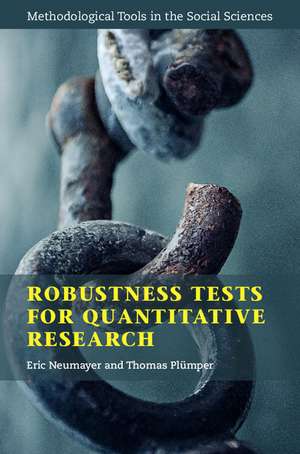Robustness Tests for Quantitative Research: Methodological Tools in the Social Sciences
Autor Eric Neumayer, Thomas Plümperen Limba Engleză Hardback – 16 aug 2017
Preț: 382.91 lei
Preț vechi: 485.85 lei
-21% Nou
Puncte Express: 574
Preț estimativ în valută:
73.27€ • 76.70$ • 60.63£
73.27€ • 76.70$ • 60.63£
Carte indisponibilă temporar
Doresc să fiu notificat când acest titlu va fi disponibil:
Se trimite...
Preluare comenzi: 021 569.72.76
Specificații
ISBN-13: 9781108415392
ISBN-10: 1108415393
Pagini: 268
Dimensiuni: 156 x 235 x 17 mm
Greutate: 0.56 kg
Editura: Cambridge University Press
Colecția Cambridge University Press
Seria Methodological Tools in the Social Sciences
Locul publicării:Cambridge, United Kingdom
ISBN-10: 1108415393
Pagini: 268
Dimensiuni: 156 x 235 x 17 mm
Greutate: 0.56 kg
Editura: Cambridge University Press
Colecția Cambridge University Press
Seria Methodological Tools in the Social Sciences
Locul publicării:Cambridge, United Kingdom
Cuprins
1. Introduction; Part I. Robustness – A Conceptual Framework: 2. Causal complexity and the limits to inferential validity; 3. The logic of robustness testing; 4. The concept of robustness; 5. A typology of robustness tests; 6. Alternatives to robustness testing?; Part II. Robustness Tests and the Dimensions of Model Uncertainty: 7. Population and sample; 8. Concept validity and measurement; 9. Explanatory and omitted variables; 10. Functional forms beyond default; 11. Causal heterogeneity and context conditionality; 12. Structural change as temporal heterogeneity; 13. Effect dynamics; 14. Spatial correlation and dependence; 15. Conclusion.
Recenzii
'Neumayer and Plümper have made an impressive contribution to research methodology. Rich in innovation and insight, Robustness Tests for Quantitative Research shows social scientists the way forward for improving the quality of inference with observational data. A must-read!' Harold D. Clarke, Ashbel Smith Professor, University of Texas, Dallas
Notă biografică
Descriere
This highly accessible book presents robustness testing as the methodology for conducting quantitative analyses in the presence of model uncertainty.




